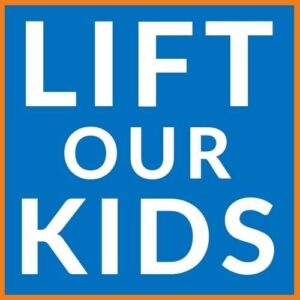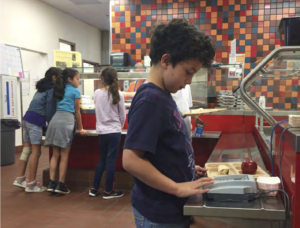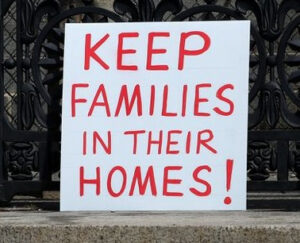Massachusetts Senate Passes Meal Debt Legislation
 Today, the Massachusetts Senate passed H. 3999, An Act to Promote School Nutrition, which will address the challenge that children and families living in poverty face when it comes to unpaid school meal debt. You can learn more about this legislation on the MLRI blog or in Commonwealth Magazine.
Today, the Massachusetts Senate passed H. 3999, An Act to Promote School Nutrition, which will address the challenge that children and families living in poverty face when it comes to unpaid school meal debt. You can learn more about this legislation on the MLRI blog or in Commonwealth Magazine.
“We are very pleased that the Massachusetts House and Senate unanimously passed this important Legislation. Children should never be caught in the middle of school meal debt, denied hot meals or prevented from participating in extracurricular activities or graduation due to unpaid meal debt,” said Patricia Baker, the Massachusetts Law Reform Institute’s food security expert.
Pandemic Related Unemployment Benefits Have Ended. Now What?
 On September 4th, the pandemic-related unemployment benefits offered by the federal government ended. Those included:
On September 4th, the pandemic-related unemployment benefits offered by the federal government ended. Those included:
- Pandemic Unemployment Assistance (PUA), for many left out of traditional unemployment;
- Pandemic Emergency Unemployment Compensation (PEUC), which extended the weeks for regular unemployment;
- Federal Pandemic Unemployment Compensation (FPUC), an additional $300 a week for all claimants; and
- Mixed Earners Unemployment Compensation (MEUC), an additional $100 to certain workers.
It’s a loss for so many vulnerable individuals and families struggling to put food on the table. In Massachusetts alone, more than 300,000 people have been impacted. There are many reasons individuals who lost unemployment are not able to access work right now – including child care barriers, lack of access to remote work jobs for those who are immunocompromised, concerns regarding the Delta variant of COVID-19, and more. For those who are able to access work, the hours or pay may not be consistent or pay a living wage. Benefits from the Department of Transitional Assistance (DTA) are a critical tool to ensure individuals and families can put food on the table.
So now what?
Massachusetts Takes Another Step Toward Lifting Kids Out of Deep Poverty
 In July 2021, Massachusetts made further progress towards Lifting Kids Out of Deep Poverty with a 9.1 percent increase in cash assistance grants for families with children, elders, and people with disabilities. Thanks to the incredible advocacy and leadership of Senator Sal DiDomenico and Representative Marjorie Decker, together with 121 legislative co-sponsors of the Act to Lift Kids Out of Deep Poverty, the FY 2022 budget in July 2021 included this significant step forward.
In July 2021, Massachusetts made further progress towards Lifting Kids Out of Deep Poverty with a 9.1 percent increase in cash assistance grants for families with children, elders, and people with disabilities. Thanks to the incredible advocacy and leadership of Senator Sal DiDomenico and Representative Marjorie Decker, together with 121 legislative co-sponsors of the Act to Lift Kids Out of Deep Poverty, the FY 2022 budget in July 2021 included this significant step forward.
MLRI is proud to lead, along with Greater Boston Legal Services, the Lift Our Kids Coalition, a group comprised of 147 organizations throughout Massachusetts committed to Lifting Kids Out of Deep Poverty in Massachusetts.
People living below half the poverty level – currently $915 a month for a family of three – are considered to be in Deep Poverty. In January 2021, the Legislature took a historic first step with a 10 percent increase in cash assistance grants, raising the maximum benefit for three from $593 a month to $652 a month. This was the first increase in two decades.
Reconsidering Welfare Reform
 Twenty-five years ago this week, President Clinton signed “The Personal Responsibility and Work Opportunity Reconciliation Act” – better known as the Welfare Reform Act – into law. The bill was controversial at the time, especially among anti-poverty advocates who worried that the law’s impact on people living in poverty would be significant and significantly harmful.
Twenty-five years ago this week, President Clinton signed “The Personal Responsibility and Work Opportunity Reconciliation Act” – better known as the Welfare Reform Act – into law. The bill was controversial at the time, especially among anti-poverty advocates who worried that the law’s impact on people living in poverty would be significant and significantly harmful.
Turns out our fears were very much founded.
The results of the law have been devastating. Income inequality has grown exponentially in the last thirty years. According to the Center for Budget and Policy Priorities, “the best survey data show that the share of wealth held by the top 1 percent rose from 30 percent in 1989 to 39 percent in 2016, while the share held by the bottom 90 percent fell from 33 percent to 23 percent.” There are many structural reasons for the concentration of wealth, not the least of which is the fact that sometime in the 1970s, wages and productivity decoupled, meaning that while people were working longer hours, that hasn’t been reflected in their paycheck. But it’s also not difficult to imagine that our porous social safety net has also played a role.
As inequality becomes more prevalent in our society and poverty ever more punitive, we all realize that the time has come to rebuild our safety net. It’s time to reform welfare reform.
MLRI Applauds Passage of Meal Debt Legislation in the Massachusetts House of Representatives
 Last week, the Massachusetts House of Representatives passed An Act Promoting School Nutrition (H.3999), which will address the challenge that children and families living in poverty face when it comes to unpaid school meal debt. That legislation, championed in the House by State Reps. Andres X. Vargas of Haverhill and Sean Garballey of Arlington, will both ensure that more students have access to free school meals and prevent school business practices that effectively punish or embarrass students when their families incur meal debt. The Senate is pending action on a similar bill filed by Senate Majority Leader Cynthia Stone Creem, S. 298.
Last week, the Massachusetts House of Representatives passed An Act Promoting School Nutrition (H.3999), which will address the challenge that children and families living in poverty face when it comes to unpaid school meal debt. That legislation, championed in the House by State Reps. Andres X. Vargas of Haverhill and Sean Garballey of Arlington, will both ensure that more students have access to free school meals and prevent school business practices that effectively punish or embarrass students when their families incur meal debt. The Senate is pending action on a similar bill filed by Senate Majority Leader Cynthia Stone Creem, S. 298.
Patricia Baker, MLRI’s food security expert, noted:
“This legislation represents a major step by the Massachusetts House of Representatives toward boosting federal nutrition dollars for local schools and reducing the burden of school meal debt on families with children. In addition to requiring more schools with high numbers of low-income students to provide universal free meals, this legislation prevents schools from involving or punishing students for meal debt. As we work toward universal school meals for all, we deeply appreciate Speaker Mariano and House leadership in passing Rep Vargas’ bill.”
In 2018, the Massachusetts Law Reform Institute issued a report that looked at unpaid school meal policies in 154 Massachusetts school districts and how they can become punitive towards children in low-income households. We also looked at how some other states across the nation were addressing this practice, a summary of which you can find in this opinion piece at WBUR.
Facing Eviction or Worried About Paying Rent? Help Is Available

On July 31st, the federal eviction moratorium, put in place as the pandemic took hold in 2020 by the U.S. Centers for Disease Control, expired. On August 3rd, the Biden Administration announced a moratorium that is similar but does not presently cover all Massachusetts residents – but it will give the Commonwealth time to act on the COVID Housing Equity bill, which we at MLRI are working diligently to see passed.
The reality is that even today tenants across Massachusetts continue to be at risk of eviction during this escalating public health crisis. Advocates fear confusion around the CDC order will result in displacement, and its expiration will bring a new wave of eviction cases. It’s worth noting that when the state allowed its moratorium to expire last fall, more than 19,000 people were sued for eviction and thousands of pending cases that were on hold resumed making their way through the court system.
At MLRI, we are urging tenants not to panic, not to move out, and to seek rental assistance and legal aid. The silver lining to this very dark cloud is that there are unprecedented amounts of federal funds available to help with rent and mortgage payments, utility assistance, and moving expenses. Tenants should apply immediately for assistance. There are also free legal services lawyers available to provide advice and representation, and community organizations to offer support and information.
FindYourFunds.org Helping Vulnerable Massachusetts Residents
 The Massachusetts Law Reform Institute assisted The Shah Family Foundation in launching a centralized website last month called FindYourFunds.org. The site helps Massachusetts residents access federal cash payments through expanded federal tax credit programs. These programs include the Earned Income Tax Credit (EITC), Child Tax Credit (CTC), and Economic Impact Payments (also known as stimulus checks). Children’s HealthWatch, Greater Boston Legal Services, and Massachusetts Association for Community Action (MASSCAP) also collaborated on the website.
The Massachusetts Law Reform Institute assisted The Shah Family Foundation in launching a centralized website last month called FindYourFunds.org. The site helps Massachusetts residents access federal cash payments through expanded federal tax credit programs. These programs include the Earned Income Tax Credit (EITC), Child Tax Credit (CTC), and Economic Impact Payments (also known as stimulus checks). Children’s HealthWatch, Greater Boston Legal Services, and Massachusetts Association for Community Action (MASSCAP) also collaborated on the website.
“The pandemic caused an economic crisis that has laid bare the stark, systemic inequities and challenges facing low-income families across the Commonwealth, especially Black and Latinx communities,” said our executive director, Georgia Katsoulomitis, at the time of the launch. “Our lowest income households are the most likely to be left out of this critical federal relief. FindYourFunds.org connects families to the multilingual information they need and is a resource state agencies can share broadly with families across the Commonwealth. FindYourFunds.org will increase access and decrease barriers.”
The site is helping people from across the Commonwealth access the support they need during these still-challenging times. As the Boston Globe reported, the IRS has estimated that about 58,000 children will miss out on the Child Tax Credit unless they are connected to the tax system. Since June 1, about 140,000 unique visitors have visited FindYourFunds.org. There is a clear need for assistance among vulnerable individuals and families and this site is helping to address that need.
FindYourFunds.org is a simple, one-stop-shop with information on who is eligible for these programs and how to apply, as well as links to free resources that provide guidance and application assistance. If you believe you qualify for additional support – or know someone who does – please make sure to visit the site.
The End of Slavery in Massachusetts: How the Power of Law Fulfilled the Promise of Justice

In the same year that the American Revolution officially ended and the Treaty of Paris was signed — 1783 — the Commonwealth of Massachusetts effectively abolished the institution of slavery. Some 80 years before the signing of the Emancipation Declaration and 82 years before the last enslaved individuals in Galveston, Texas were freed in 1865, Massachusetts determined that enslaving Black men and women was incompatible with its new state constitution and ended the barbaric practice. And all of it was achieved through the legal system, not through armed conflict.
This, of course, does not excuse the participation of the Commonwealth in an institution that has wrought so much damage on generations of Black Americans. Massachusetts, like our nation as a whole, must grapple with the destructive legacy and lasting trauma of slavery and with the massacres and forced relocations of Native and indigenous people within our borders.
But as we celebrate Juneteenth on June 19, which marked the unequivocal termination of the abhorrent practice in the United States, it is also worth knowing the history of slavery’s end in Massachusetts — and how the legal system and two courageous individuals played a pivotal role in it.
